介词和连词的用法及专项练习
介词连词练习题
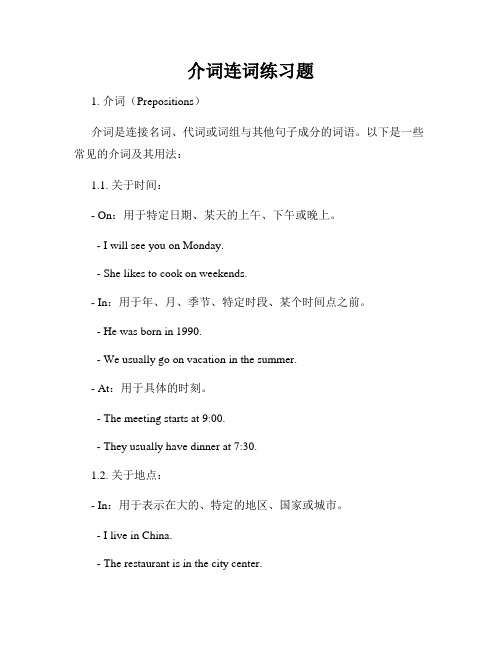
介词连词练习题1. 介词(Prepositions)介词是连接名词、代词或词组与其他句子成分的词语。
以下是一些常见的介词及其用法:1.1. 关于时间:- On:用于特定日期、某天的上午、下午或晚上。
- I will see you on Monday.- She likes to cook on weekends.- In:用于年、月、季节、特定时段、某个时间点之前。
- He was born in 1990.- We usually go on vacation in the summer.- At:用于具体的时刻。
- The meeting starts at 9:00.- They usually have dinner at 7:30.1.2. 关于地点:- In:用于表示在大的、特定的地区、国家或城市。
- I live in China.- The restaurant is in the city center.- On:用于表示在街道、大街、公路等具体地点。
- The post office is on Main Street.- The accident happened on the highway.- At:用于表示在具体的建筑、地址或地方。
- She is waiting for you at the cinema.- They will meet at the coffee shop.1.3. 关于方式:- By:用于表示通过某种交通工具、方式或手段。
- I usually go to work by bus.- We communicate by email.- With:用于表示携带某物或与某人一起。
- He always goes to the gym with his friends.- She wrote the letter with a pen.2. 连词(Conjunctions)连词是连接两个词、短语、从句或句子的词语。
介词和连词的用法及专项练习

介词和连词的用法(一)表示时间的介词1.英语里最常见的时间介词有:at, in, on, before, after和from。
2.at , in和on这三个词都表示时间。
✧at主要指具体的钟点:at half past eight 在八点半✧in一般指某一段时间:in January 在一月份✧on指具体在某一天:on Monday 在星期一3.before和after表示时间的先后顺序。
✧before表示“在……之前”。
You should wash your hands before eating. 吃饭前你应该洗手。
✧after表示“在……之后”。
They often play basketball after dinner. 他们放学后经常打篮球。
4.from作时间介词含有“从……开始”的意思,常和to连用,组成“from…to…”的结构,表示“从……到……”的意思。
We go to school from Monday to Friday. 我们从周一到周五上学。
(二)表示方位的介词,也就是表示位置和地点的介词。
1.小学阶段常见的方位介词有:on, in, at, under, over, above, below, about, around,between等。
2.on, over和above这三个词都有“在……上面”的意思,但它们所表示的方位还是有些不同。
✧on表示两个物体的表面相互接触。
如:There is a book on the desk. 桌上有一本书。
The boy is sleeping on the desk. 那个孩子睡在地上。
✧over表示“在……的正上方”,两个物体表面没有接触。
如:There is a light bulb over my head. 在我头顶上有一个灯泡。
✧above表示两个物体中一个在另一个的上方,如:The plane is flying above the clouds. 飞机上云层上飞行。
2022高考英语语法--介词连词讲解及习题(附答案)
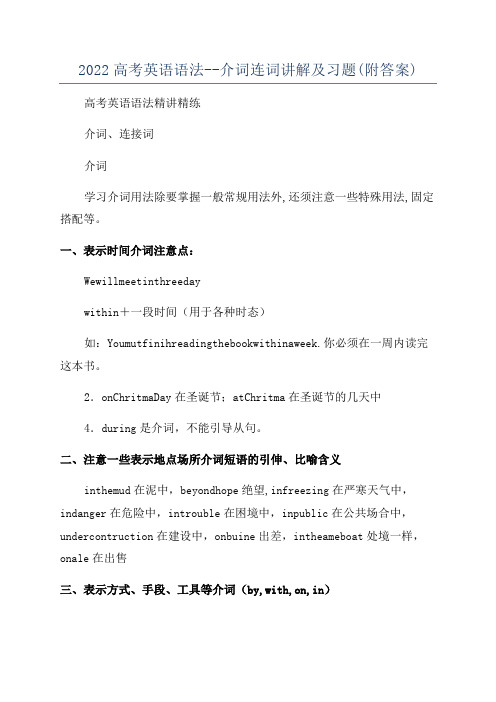
2022高考英语语法--介词连词讲解及习题(附答案)高考英语语法精讲精练介词、连接词介词学习介词用法除要掌握一般常规用法外,还须注意一些特殊用法,固定搭配等。
一、表示时间介词注意点:Wewillmeetinthreedaywithin+一段时间(用于各种时态)如:Youmutfinihreadingthebookwithinaweek.你必须在一周内读完这本书。
2.onChritmaDay在圣诞节;atChritma在圣诞节的几天中4.during是介词,不能引导从句。
二、注意一些表示地点场所介词短语的引伸、比喻含义inthemud在泥中,beyondhope绝望,infreezing在严寒天气中,indanger在危险中,introuble在困境中,inpublic在公共场合中,undercontruction在建设中,onbuine出差,intheameboat处境一样,onale在出售三、表示方式、手段、工具等介词(by,with,on,in)1.by:Theblindmenthoughttheycouldlearnwhattheelephantlookedli kebytouchingit./makealivingbyteaching/byhand手工地,靠手工地,byletter,bypot,byelectricity,learnth.byheart,truckbythebeauty因美丽而着迷Hewapaidbythehour/theday/month/…他按时/日/月/…被付给工钱。
byplane/train/hip/air/water/ea/…,bymeanof用…手段,方式;bywayof经由,取道于…learnEnglihby/over/throug h/ontheradio2.on:liveonfood,kneelonone¢knee,lie/leeponone¢back/ide/face 仰/侧/俯卧(睡)3.in:inEnglih,inink,inilence,inonevoice异口同声地,inahurry 匆忙地,inurprie惊讶地4.with:writewithapen,workwithone¢hand,mellwithone¢noe,beatt hehorewithawhip(鞭子)四、相近介词(短语)辨析about“关于”,知识性或随便谈论:adicuionabouttheplan3.over在…正上方,under在…正下方above在…上面(不一定垂直上方),below在…下面4.inanhour一小时后,用于将来时afteranhour一小时后,用于过去时5.beide在…旁边beide除…之外(还有)e某cept除…之外e某ceptfor除(非同类事物)之外6.on/inthetreetat50DongfengRoad在东风路50号高考英语语法精讲精练7.aholeinthewallapictureonthewallapieceofnewinthenewpaperthewordintheenvelopthemonkeyinthetreetheappleonthetree(树上的苹果。
介词与连词讲解与练习(答案)
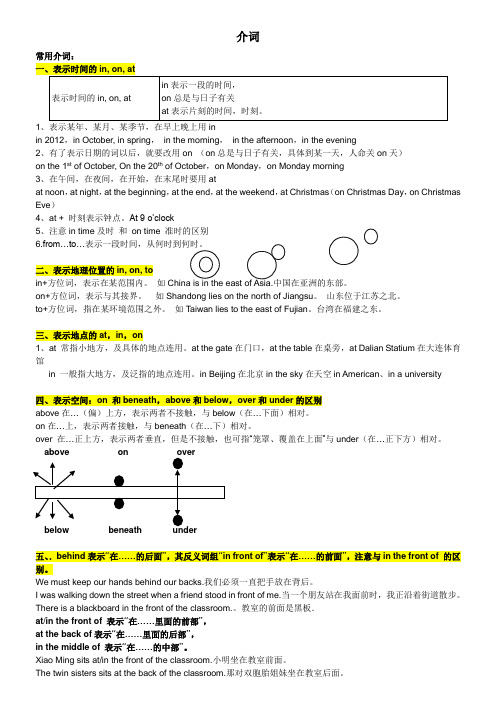
介词常用介词:1、表示某年、某月、某季节,在早上晚上用inin 2012,in October, in spring,in the morning,in the afternoon,in the evening2、有了表示日期的词以后,就要改用on (on总是与日子有关,具体到某一天,人命关on天)on the 1st of October, On the 20th of October,on Monday,on Monday morning3、在午间,在夜间,在开始,在末尾时要用atat noon,at night,at the beginning,at the end,at the weekend,at Christmas(on Christmas Day,on Christmas Eve)4、at + 时刻表示钟点。
At 9 o’clock5、注意in time及时和on time 准时的区别6.from…to…二、表示地理位置的in, on, toin+方位词,表示在某范围内。
如on+方位词,表示与其接界。
如Shandong lies on the north of Jiangsu。
山东位于江苏之北。
to+方位词,指在某环境范围之外。
如Taiwan lies to the east of Fujian。
台湾在福建之东。
三、表示地点的at,in,on1、at 常指小地方,及具体的地点连用。
at the gate在门口,at the table在桌旁,at Dalian Statium在大连体育馆in 一般指大地方,及泛指的地点连用。
in Beijing在北京in the sky在天空in American、in a university四、表示空间:on 和beneath,above和below,over和under的区别above在…(偏)上方,表示两者不接触,与below(在…下面)相对。
小学专项练习介词与连词练习题及
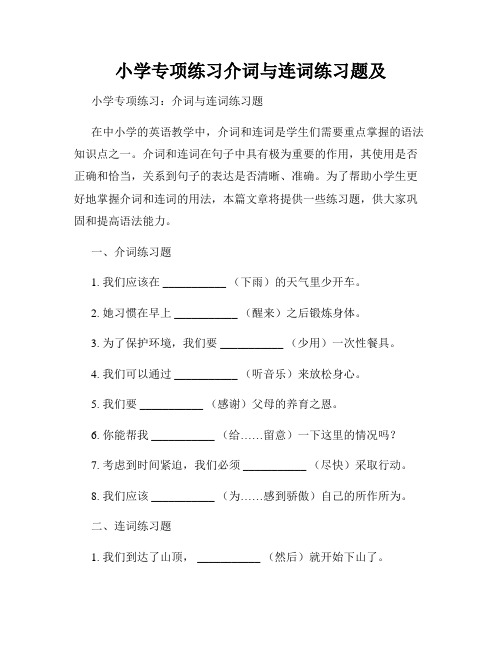
小学专项练习介词与连词练习题及小学专项练习:介词与连词练习题在中小学的英语教学中,介词和连词是学生们需要重点掌握的语法知识点之一。
介词和连词在句子中具有极为重要的作用,其使用是否正确和恰当,关系到句子的表达是否清晰、准确。
为了帮助小学生更好地掌握介词和连词的用法,本篇文章将提供一些练习题,供大家巩固和提高语法能力。
一、介词练习题1. 我们应该在 ___________ (下雨)的天气里少开车。
2. 她习惯在早上 ___________ (醒来)之后锻炼身体。
3. 为了保护环境,我们要 ___________ (少用)一次性餐具。
4. 我们可以通过 ___________ (听音乐)来放松身心。
5. 我们要 ___________ (感谢)父母的养育之恩。
6. 你能帮我 ___________ (给……留意)一下这里的情况吗?7. 考虑到时间紧迫,我们必须 ___________ (尽快)采取行动。
8. 我们应该 ___________ (为……感到骄傲)自己的所作所为。
二、连词练习题1. 我们到达了山顶, ___________ (然后)就开始下山了。
2. 小明很努力地学习, ___________ (可是)他的成绩一直不太理想。
3. 妈妈不在家, ___________ (因此)他们必须独立地完成家务。
4. 昨天下雨了, ___________ (所以)我们没能去公园玩。
5. 自从搬到这个新小区, ___________ (因为)他交到了很多新朋友。
6. 我们应该尽力帮助别人, ___________ (无论)这对我们自己有没有帮助。
7. 她有很多的才华和优点, ___________ (然而)她还需要在某些方面努力。
8. 他常常熬夜学习, ___________ (结果)身体越来越差。
三、综合练习题1. 我很感激我的老师,是 ___________ 她 ___________ 给我帮助,我才能在考试中取得好成绩。
六年级英语介词与连词训练单选题60题(含答案)
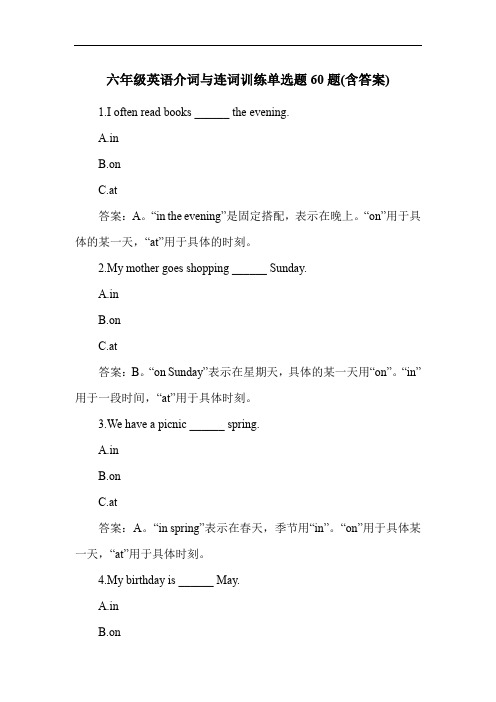
六年级英语介词与连词训练单选题60题(含答案)1.I often read books ______ the evening.A.inB.onC.at答案:A。
“in the evening”是固定搭配,表示在晚上。
“on”用于具体的某一天,“at”用于具体的时刻。
2.My mother goes shopping ______ Sunday.A.inB.onC.at答案:B。
“on Sunday”表示在星期天,具体的某一天用“on”。
“in”用于一段时间,“at”用于具体时刻。
3.We have a picnic ______ spring.A.inB.onC.at答案:A。
“in spring”表示在春天,季节用“in”。
“on”用于具体某一天,“at”用于具体时刻。
4.My birthday is ______ May.A.inB.on答案:A。
“in May”表示在五月,月份用“in”。
“on”用于具体某一天,“at”用于具体时刻。
5.I get up ______ six o'clock in the morning.A.inB.onC.at答案:C。
“at six o'clock”表示在六点钟,具体时刻用“at”。
“in”用于一段时间,“on”用于具体某一天。
6.They go to school ______ Monday to Friday.A.fromB.onC.at答案:A。
“from Monday to Friday”表示从周一到周五。
“on”用于具体某一天,“at”用于具体时刻。
7.My father comes back home ______ night.A.inB.onC.at答案:C。
“at night”是固定搭配,表示在晚上。
“in”用于一段时间,“on”用于具体某一天。
8.We have an English class ______ Wednesday afternoon.B.onC.at答案:B。
六年级英语介词与连词训练练习题30题(带答案)
六年级英语介词与连词训练练习题30题(带答案)1.I usually go to school ______ seven o'clock in the morning.A.atB.onC.in答案解析:A。
at 用于具体的时刻前;on 用于具体的某一天;in 用于较长的时间段,如年、月、季节等。
题目中seven o'clock 是具体时刻,所以用at。
2.My birthday is ______ May.A.atB.onC.in答案解析:C。
in 用于月份前;on 用于具体的某一天;at 用于具体的时刻前。
题目中May 是月份,所以用in。
3.We often go swimming ______ summer.A.atB.onC.in答案解析:C。
in 用于季节前;on 用于具体的某一天;at 用于具体的时刻前。
题目中summer 是季节,所以用in。
4.My father goes to work ______ Monday to Friday.A.fromB.onC.in答案解析:A。
from...to...表示从……到……;on 用于具体的某一天;in 用于较长的时间段。
题目中表示从周一到周五,所以用from。
5.I get up early ______ the morning.A.atB.onC.in答案解析:C。
in the morning 是固定搭配,表示在早上;at 用于具体的时刻前;on 用于具体的某一天。
6.She was born ______ 2008.A.atB.onC.in答案解析:C。
in 用于年份前;on 用于具体的某一天;at 用于具体的时刻前。
题目中2008 是年份,所以用in。
7.We have a party ______ the evening of December 31st.A.atB.onC.in答案解析:B。
on 用于具体的某一天的上午、下午、晚上;in 用于较长的时间段;at 用于具体的时刻前。
六年级英语介词与连词训练练习题30题(答案解析)
六年级英语介词与连词训练练习题30题(答案解析)1.I often do my homework ______ evening.A.in theB.on theC.at theD.of the答案解析:A。
“in the evening”是固定搭配,表示在晚上。
“on”通常用于具体的某一天或某天的上午、下午、晚上,如“on Sunday evening”;“at”通常用于具体的时间点,如“at six o'clock”;“of”不用于表示时间。
2.She gets up early ______ the morning.A.inB.onC.atD.for答案解析:A。
“in the morning”是固定搭配,表示在早上。
“on”通常用于具体的某一天或某天的上午、下午、晚上;“at”通常用于具体的时间点;“for”表示持续一段时间,不用于表示具体的时间。
3.My father goes to work ______ Monday morning.A.inB.onC.at答案解析:B。
“on Monday morning”表示在具体的某一天的上午,用“on”。
“in”用于泛指的上午、下午、晚上等;“at”用于具体的时间点;“of”不用于表示时间。
4.We have a music class ______ Wednesday afternoon.A.inB.onC.atD.to答案解析:B。
“on Wednesday afternoon”表示在具体的某一天的下午,用“on”。
“in”用于泛指的上午、下午、晚上等;“at”用于具体的时间点;“to”不用于表示时间。
5.They play basketball ______ Saturday.A.inB.onC.atD.for答案解析:B。
“on Saturday”表示在具体的某一天,用“on”。
“in”用于泛指的一段时间,如“in May”;“at”用于具体的时间点;“for”表示持续一段时间。
六年级英语介词与连词训练练习题30题含答案解析
六年级英语介词与连词训练练习题30题含答案解析1.I usually go to school ______ seven o'clock in the morning.A.atB.onC.in答案解析:A。
at 用于具体的时刻前;on 用于具体的某一天;in 用于年、月、季节以及泛指的上午、下午、晚上等。
这里是具体的时刻七点,所以用at。
2.My birthday is ______ May.A.atB.onC.in答案解析:C。
in 用于年、月、季节等;on 用于具体的某一天;at 用于具体的时刻前。
这里是月份五月,所以用in。
3.We often have a picnic ______ Sunday afternoon.A.atB.onC.in答案解析:B。
on 用于具体的某一天的上午、下午、晚上;in 用于年、月、季节以及泛指的上午、下午、晚上等;at 用于具体的时刻前。
这里是具体的周日下午,所以用on。
4.My father gets up early ______ the morning.A.atB.onC.in答案解析:C。
in the morning 是固定搭配,表示在早上。
at 用于具体的时刻前;on 用于具体的某一天。
5.She goes to bed late ______ night.A.atB.onC.in答案解析:A。
at night 是固定搭配,表示在晚上。
in 用于年、月、季节以及泛指的上午、下午、晚上等;on 用于具体的某一天。
6.The meeting will start ______ ten minutes.A.inB.afterC.on答案解析:A。
in 加一段时间表示在一段时间之后;after 后面一般跟具体的时间点或时间段;on 用于具体的某一天。
这里是十分钟之后,所以用in。
7.He finished his homework ______ an hour.A.inB.afterC.on答案解析:A。
中考英语专项练习-介词和连词(6页)
介词和连词考点一、常用介词的种类及意义介词是一种用来表示词与词、词与句之间的关系的虚词,后面一般有名词、代词或相当于名词的其他词类,短语或从句作它的宾语。
1.表 示地 点位 置的 介词 2.表 示时 间的 介词3.表 示运 动方 向的 介词4.表示“在……之间”的介词:5.表示其他意义的介词at,in,on “在……”。
at 表示“小地方”;in 表示“大地方”; on 表示毗邻,接壤,to 表示在……范围外,不接壤。
above,over,on“在……上”。
above 表示“不一定正上方”,over 表示“正上方”;on 表示“物面相接触”below, under“在……下面“。
under 表示在…正下方;below :表示不一定在正下方。
in front of…:“在……前面”,in the front of “在…..的前部”in,on,at 在……时。
in 表示较长时间,如世纪、时代、年、季节、月及一般(非特指)的早、中、晚等;on 表示具体一天及其早、中、晚;at 表示某一时刻或较短暂的时间,泛指节日等。
in,after 在……之后。
“in+一段时间”表示将来的一段时间以后;“after+一段时间”表示过去的一段时间以后;“after+将来的时间点”表示将来的某一时刻以后。
from, since for“自从……”。
from 仅说明什么时候开始,不说明某动作或情况持续多久;since 表示"自(某具体时间)以来";for 指动作延续贯穿整个过程,后接时间段。
after, behind 在……之后across, through ,past 通过,穿过。
across 表示横穿,即从物体表面通过,与on 有关,为二维;through 穿过,即从物体内部穿过,与in 有关,为三维;past 从物体的旁边通过。
from...to...从......到......to, towards, onto, into ,out of :to 到某处去;towards 朝着某个方向去;onto 放到某物上面; into 进入物体内部 ;out of 从物体内部出来 up, down :up 向上;down 向下over, around :over 从上方跃过;around 环绕一圈 along 沿着between ,among :between 指“两者之间”;among 指在“三者或三者以上之间。
- 1、下载文档前请自行甄别文档内容的完整性,平台不提供额外的编辑、内容补充、找答案等附加服务。
- 2、"仅部分预览"的文档,不可在线预览部分如存在完整性等问题,可反馈申请退款(可完整预览的文档不适用该条件!)。
- 3、如文档侵犯您的权益,请联系客服反馈,我们会尽快为您处理(人工客服工作时间:9:00-18:30)。
介词和连词的用法(一) 表示时间的介词1. 英语里最常见的时间介词有: at, in, on, before, after 和from 。
2. at , in 和on 这三个词都表示时间。
at 主要指具体的钟点: at half past eight 在八点半in 一般指某一段时间:in January在一月份on 指具体在某一天: on Monday 在星期一3. before 和after 表示时间的先后顺序。
before 表示"在 .... 之前”。
You should wash your hands before eati ng.吃饭前你应该洗手。
after 表示"在 ..... 之后”。
They ofte n play basketball after dinner.他们放学后经常打篮球。
4. from 作时间介词含有“从 ... 开始”的意思,常和 to 连用,组成“ from …to …的结构,表示“从……到……”的意思。
We go to school from Monday to Friday.我们从周一到周五上学。
(二)表示方位的介词,也就是表示位置和地点的介词。
1. 小学阶段常见的方位介词有: on, i n, at, un der, over, above, below, about,around, betwee n 等。
2. on, over 禾口 above这三个词都有"在 ... 上面”的意思,但它们所表示的方位还是有些不同。
The boy is sleep ing on the desk.over 表示"在 .... 的正上方” There is a light bulb over my head.above 表示两个物体中一个在另一on 表示两个物体的表面相互接触。
如: There is a book on the desk.桌上有一本书。
那个孩子睡在地上。
,两个物体表面没有接触。
如:在我头顶上有一个灯泡。
个的上方,如:飞机上云层上飞行。
The pla ne is flying above the clouds. There are four lights above our head.There is a ball un der the chair. 椅子下面有一个球。
They are sitti ng un der a big tree. 他们正坐在一棵大树下面。
below表示"在..... ”的下面,不强调是否在正下方。
Their house is below mi ne. 他们家的房子在我家的下面。
4.in表示位置“在……里面”,也可以用来表示在一个很大的空间内。
The childre n are play ing in the room. 孩子们正在房间里玩。
All my books are in my bag. 我所有的书都在我的书包里。
5.around 表示 "在 ... 周围”。
There are lots of flowers around the house. 房子周围有许多花。
The childre n sat around the Christmas tree and sang happily.孩子们围坐在圣诞树旁边高兴地唱歌。
6. behind表示"在...... 的后面”。
Don' t hide yourself behi nd a tree. 别躲在树后。
7. in front of 表示"在...... 的前面”。
There are some trees in front of the house. 房子前面有一些树。
8.between表示"在两者之间”。
My home is betwee n the two mountains. 我家在两座大山之间。
Gua ng Jie sits betwee n Li Lei and Fa ng Nin g. 冠杰坐在李磊和芳宁之间。
(三)表示方式的介词9.常见的表示方式的介词有:by, with, i n 等。
10.by表示“靠……”,“用……”。
11.with表示“使用……”,“和……一起”,“有……”,“具有……”“带有……”。
12.in表示“用... (语言)”。
My father goes to work by car. 我父亲开车上班。
I can see with eyes. 我能用眼睛看。
I can speak in En glish. 我会用英语讲。
连词and 意思是“和”,表示并列和对称。
I can speak English and Chinese. I like apples, bananas and grapes.2. but 意思是“但是”,表示转折。
' t take medicine. 我感冒了,但我没吃药。
The skirt is nice, but it ' s too expensive. 这条裙子很漂亮,但太贵了。
3.so 意思是“因此”,“所以”。
It ' s dark, so I must go now.天黑了,所以我得走了。
You got up too late, so you missed the bus.你起床晚了,所以错过了公共汽车。
一、选择填空。
( ) 1. The Greens were watching TV ____________ I came in. A. before B. after C. when( ) 2. Jack was sad ____ he failed his math exam again. A. so B. because C. but( ) 3. The bus arrived ___ 7:30 a. m. A. on B. at C. in( ) 4. Your mouth is _____ your nose. A. under B. below C. near ( ) 5. We don ' t go to school ________ Saturday and Sunday. A. on B. inC. at( ) 6. Did you go to the zoo ___ foot? A. by B. on C. in ( ) 7. I write ___ my hand. A. in B. with C. by ( ) 8. Can you sing this song ____ English?A. inB. withC. on1. or 意思是“或者”,“还是”, 表示选择。
我会讲英语和中文。
我喜欢苹果、香蕉和葡萄Is your friend is a boy or a girl? 你的朋友是男孩还是女孩? Do you learn English or French?你学英语还是法语?注意:误) I don ' t like coffee and te a.正) I don ' t like coffee or te a. 我不喜欢喝咖啡和茶。
正) I like coffee and tea.我喜欢喝咖啡和茶。
I have a cold, but I don( ) 9. He learns English _____ TV.A. inB. onC. with( ) 10. Tony comes ______ Australia.A. fromB. toC. in( ) 11. Everyone is sitting ___ the floor, but Mr Brown is sitting a chair ____ the corner.A. over, in, onB. about, on, atC. on, on, in( ) 12. During the weekdays, Jim gets up early __ the morning and goes to bed late ___ night .But ____ weekends he sleeps until midday.A. on, at, atB. in, at, onC. in, in, at( ) 13. The mother is coming back ___ an hour.A. afterB. forC. in( ) 14. Don ' t worry, Tom will return ______ .A. before longB. long beforeC. long ago( ) 15. Paper is often made ___ wood.A. byB. inC. of二.介词填空1.Tony is ________ Canada.2.What is the name ________ the factory?3.Betty is English. What ______ you ?4.Where do you come __________ ?5.Do the students stay ________ home ________ Saturday ?6.The meeting ended __________ 6 .7.We' ll play football _____ class .8.—where are you from ?9.—I am ________ Beijing.10.Let ' s count the numbers ________ one ________ fifty.11.—Where shall we meet?12.—We' ll meet ______ home.13.He is good ________ swimming.14.Tom gets __________ at seven every morning.15. _______ Sunday morning, he played football with his friends.16.What' s wrong ________ you?17.It ' s time _______ breakfast.18.Can you sing a song _________ English?19.Please listen _______ me carefully.20.Don' t be late _______ this meeting.三.用and, or, but 填空。
